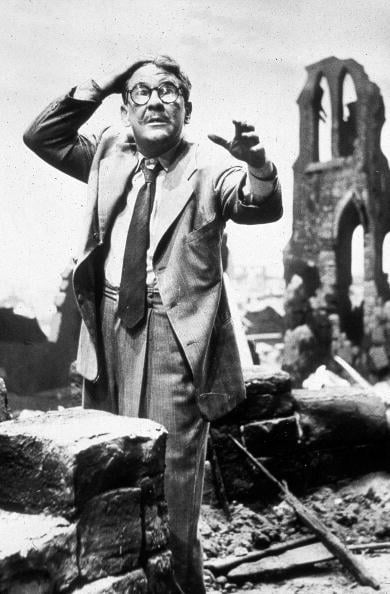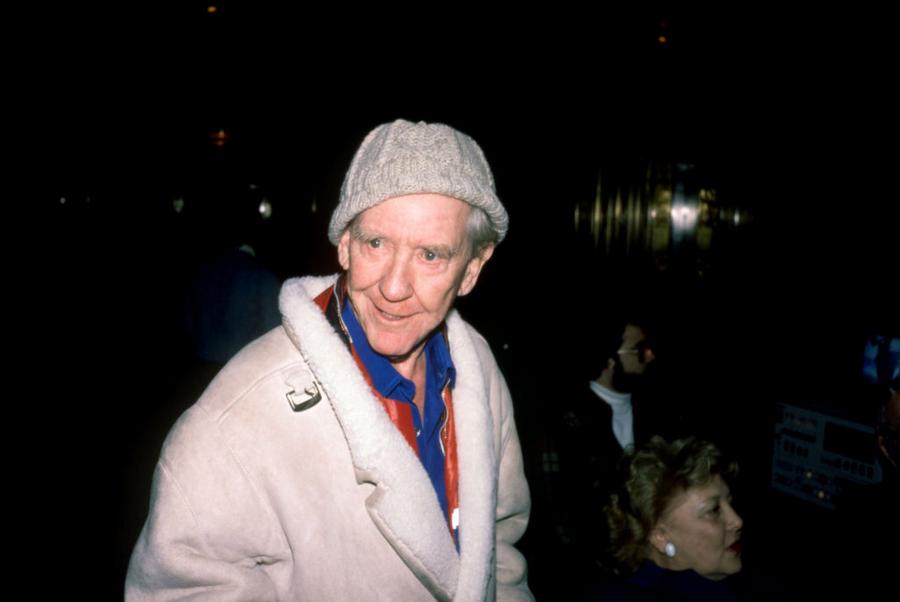Burgess Meredith at a Glance
- Categories: Celebrities > Actors, Celebrities
- Net Worth: $5 Million
- Birthdate: Nov 16, 1907 - Sep 9, 1997 (89 years old)
- Birthplace: Cleveland
- Gender: Male
- Profession: Actor, Film Producer, Film director, Screenwriter, Voice Actor, Writer, Soldier
- Nationality: United States of America
- Height: 5 ft 5 in (1.664 m)
Burgess Meredith: From Stage to Screen, a Legacy of $5 Million
Burgess Meredith, a celebrated actor and director, left an indelible mark on the entertainment industry. With a career spanning seven decades, he excelled in film, television, theater, and radio. At the time of his passing in 1997, his net worth was estimated at $5 million. This article delves into the life and career of Burgess Meredith, exploring his early years, his triumphs on stage and screen, and his lasting impact on the world of entertainment. This comprehensive overview celebrates the talent and lasting legacy of the multifaceted performer.
Early Life and Education
Oliver Burgess Meredith, the man known to the world as Burgess Meredith, was born on November 16, 1907, in Cleveland, Ohio. His parents were Ida and William Meredith. His mother’s family was rooted in the Methodist revivalist movement, an influence that shaped Meredith’s lifelong adherence to the religion. He received his education at the Hoosac School in New York before attending Amherst College in Massachusetts.
Theater Career: A Broadway Breakthrough
Meredith’s journey in the world of entertainment began on the stage. He joined Eva Le Gallienne’s Civic Repertory Theatre in New York in 1929. A year later, he made his Broadway debut in Le Gallienne’s production of “Romeo and Juliet.” He subsequently appeared in a string of successful plays, including “Siegfried,” “Liliom,” and “The Threepenny Opera.” However, it was in 1935 that Meredith achieved a major breakthrough in his career when he starred in Maxwell Anderson’s Broadway play “Winterset.” That same year, he earned further recognition for his roles in “The Barretts of Wimpole Street” and “Flowers of the Forest.” He continued to shine in Maxwell Anderson’s plays, appearing in “High Tor” and “The Star-Wagon.”
During the 1940s, Meredith took on another production of “Liliom,” this time playing the title character. In the following decade, he graced the stage in “The Fourposter,” “The Teahouse of the August Moon,” and “The Remarkable Mr. Pennypacker,” among other plays. In the 1960s, Meredith originated the role of Erie in Eugene O’Neill’s short play “Hughie.” Beyond his acting prowess, Meredith also ventured into directing. Notable directing credits include the 1960 revue “A Thurber Carnival,” the 1974 Broadway production of “Ulysses in Nighttown,” and Fionnula Flanagan’s one-woman play “James Joyce’s Women.” His work on “Ulysses in Nighttown” earned him a Tony Award nomination.

Getty
Film Career: Hollywood and Beyond
Meredith transitioned seamlessly to the silver screen, making his film debut in 1936 in “Winterset,” which was based on the Broadway play in which he had starred. He gained wider recognition for his portrayal of George Milton in the 1939 adaptation of John Steinbeck’s classic novella, “Of Mice and Men.” The 1940s saw Meredith starring in numerous films, including “Second Chorus,” “That Uncertain Feeling,” “Street of Chance,” “The Story of G.I. Joe,” “Mine Own Executioner,” and “On Our Merry Way.” He even stepped behind the camera to direct and star in “The Man on the Eiffel Tower” in the early 1950s. However, his career experienced a setback when he was placed on the Hollywood blacklist. He returned to Hollywood in the role of the titular Japanese character in the comedy “Joe Butterfly.” Later, he narrated the Academy Award-winning documentary “Albert Schweitzer.” In the early 1960s, he appeared in the political drama “Advise & Consent.” This film marked the beginning of a fruitful collaboration with director Otto Preminger. They worked on five more films: “The Cardinal” (1963), “In Harm’s Way” (1965), “Hurry Sundown” (1967), “Skidoo” (1968), and “Such Good Friends” (1971). Meredith’s filmography in the 1960s also includes notable roles in “Madame X,” “Torture Garden,” “Stay Away, Joe,” and “Hard Contract.”
The 1970s brought Meredith roles in “There Was a Crooked Man…” and “The Yin and the Yang of Mr. Go,” the latter of which he also wrote and directed. He continued to appear in films such as “Clay Pigeon,” “The Man,” and “Golden Needles.” He delivered one of his most acclaimed performances in John Schlesinger’s 1975 film “The Day of the Locust,” earning an Academy Award nomination for Best Supporting Actor for his role as ex-vaudevillian Harry Greener. He received a second consecutive nomination for Best Supporting Actor for his portrayal of boxing trainer Mickey Goldmill in the 1976 Best Picture winner, “Rocky.” Meredith would reprise his iconic role in the sequels “Rocky II” and “Rocky III.” During this time, he also appeared in “The Sentinel,” “Foul Play,” “The Great Bank Hoax,” and “Magic.” His work in the 1980s included “The Last Chase,” “Clash of the Titans,” and “Full Moon in Blue Water.” The 1990s saw Meredith in “Oddball Hall,” “State of Grace,” and “Camp Nowhere.” He played the sex-crazed nonagenarian father of Jack Lemmon’s character in “Grumpy Old Men” and “Grumpier Old Men.” “Grumpier Old Men,” released in 1995, marked Meredith’s final film appearance.

Burgess Meredith in 1985. (Photo by Oscar Abolafia/TPLP/Getty Images)
Television Career: The Small Screen Successes
Meredith’s versatility extended to television, where he found significant success. He had his first major television role narrating the NBC crime drama series “The Big Story” from 1955 to 1958. He appeared in four episodes of the anthology series “The Twilight Zone.” In the 1960s, he made guest appearances on several shows, including the Westerns “Rawhide,” “Wagon Train,” “The Loner,” and “Bonanza.” He also appeared in the second season of the NBC drama “Mr. Novak” and played the iconic villain Penguin on ABC’s “Batman.”
In the early 1970s, Meredith appeared in episodes of “Room 222,” “Mannix,” and “McCloud.” He also starred in the science-fiction fantasy series “Search.” From 1974 to 1975, he narrated the Saturday morning series “Korg: 70,000 B.C.” He played real-life lawyer Joseph Welch in the television film “Tail Gunner Joe” in 1977. In the following year, he starred in the miniseries “The Return of Captain Nemo” and voiced Puff in the first animated adaptation of the Peter, Paul and Mary song “Puff the Magic Dragon.” He reprised his role as Puff in the two sequels. Among Meredith’s later notable television credits was the short-lived CBS sitcom “Gloria,” which aired from 1982 to 1983.
Personal Life and Death
Meredith was married four times. His first marriage was to Helen Derby, from 1933 until their divorce in 1935. He was subsequently married to actress Margaret Perry from 1936 until their divorce in 1938. His third wife was actress Paulette Goddard; they were married from 1944 until their divorce in 1949 and even starred in some films together. Meredith wed his fourth and final wife, Kaja Sundsten, in 1950. They had two children, Jonathan and Tala, and remained together for 46 years.
On September 9, 1997, Burgess Meredith passed away in Malibu, California, due to complications from Alzheimer’s and melanoma. He was 89 years old at the time of his death.
Malibu House: A Coastal Legacy
For over two decades leading up to his death, Burgess Meredith owned an oceanfront mansion in Malibu’s exclusive Malibu Colony gated community. His estate sold the home in July 1999, two years after his death, for $4 million. This is approximately equivalent to $7.5 million in today’s dollars. Today, this property, with its 50 feet of ocean frontage, would be valued at over $50 million. This highlights not only his success but also the desirable location of his home.
Conclusion
Burgess Meredith’s career was a testament to his extraordinary talent and versatility. From his early days on the stage to his celebrated roles in film and television, Meredith consistently captivated audiences and earned critical acclaim. His dedication to his craft, coupled with his diverse range of roles, secured his place as a true icon in the entertainment industry. His lasting legacy is a reminder of the power of performance and the enduring impact of a life well-lived in the spotlight.

